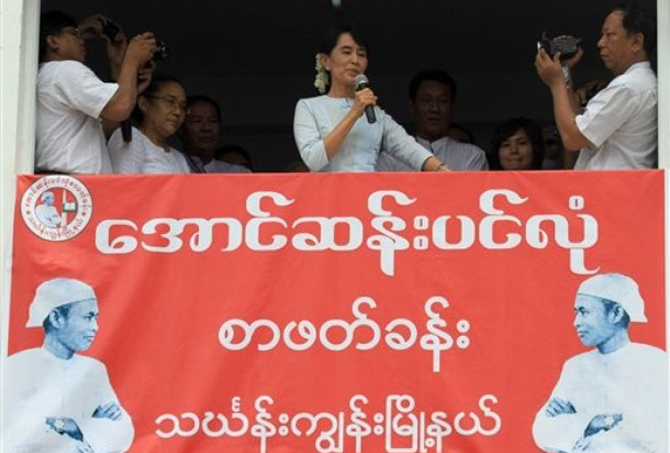The Eye of the Storm

In response, the UK ambassador rightly pushed for a separate meeting with Suu Kyi, pointing out that she is still the undisputed leader of the democratic opposition—a fact that EU member states should not deny. Germany, however, still believed that the goal of such a meeting should be to seek a wide range of views from several interlocutors, without favoring anyone in particular. The Germans must have been puzzled, then, when Thein Sein decided to hold a one-on-one meeting with Suu Kyi and she was given a VIP reception when she arrived solo at the concurrent Naypyidaw-hosted economic conference.
Despite the attempts by some to sideline her, there is no doubt that Suu Kyi is still important to the Burmese people and the majority of those in the international community. US envoy Mitchell addressed the issue directly after his visit with the pro-democracy leader: “I met with Daw Aung San Suu Kyi and leaders of the National League for Democracy to discuss their perspectives on recent developments in the country, the future of their party, and US policy approaches,” he said. “I was reminded consistently during my visit that Daw Suu remains deeply important to the citizens of this country, Burman and ethnic minority alike, and that any credible reform effort must include her participation.”
There is also no doubt that the regime still sees Suu Kyi as the main political opposition leader, as attested to by her meeting with Thein Sein. But it cannot be denied that after two decades of little apparent progress, even some members of the Burmese opposition wonder whether Suu Kyi, who is now 66 years old, can regain the momentum that propelled the NLD to victory in 1990 and deliver current reforms with respect to the big ticket items of true democracy and genuine human rights and equality.
During the nationwide uprising in 1988, Suu Kyi reluctantly entered the fray, saying that as independence hero Aung San’s daughter, she could not remain indifferent to all that was happening in Burma at that time. Addressing the hundreds of thousands of people who came to listen to her first speech in September 1988 at Shwedagon Pagoda in Rangoon, she declared: “This national crisis could in fact be called the second struggle for national independence.”
This time, however, the adversary was not the foreign colonialists that her father faced in the first struggle for independence, but home-grown dictators who, both before and after Suu Kyi spoke those fateful words in 1988, have reduced the resource-rich nation to the ranks of one of the world’s poorest pariah states. The question now is whether Suu Kyi can finally beat the odds and succeed as her father did, or whether her highly principled approach will doom her “second struggle” to failure.
Critics say that Suu Kyi lacks the pragmatism of Gen Aung San and doesn’t have a comprehensive understanding of Burma’s political complexity. They have warned that if she doesn’t change her tactics and strategy, she could become an obstacle to progress in Burma.
Some opposition politicians even criticized her stance on the election last year, saying Suu Kyi should have created a proxy party to participate in the polls and endorsed politicians who wanted to run in the election. She has thus far been opaque about the 2015 election, not saying one way or the other whether her rejection of the last election means she would rule out running in the next, especially if the government does not change the Constitution and elections laws that spurred the last boycott. This may not seem like a pressing question at the moment, but many of her supporters have begun to wonder if she has even considered her strategy for the coming years.
Suu Kyi has sent similarly ambiguous messages with respect to Western sanctions placed on the government and its leaders and cronies. For instance, she appears to remain broadly supportive of measures aimed at putting pressure on the ruling regime, even as she calls on would-be Western investors to ensure that their investments are ethical.
« previous 1 | 2 | 3 | 4 | 5 | 6 next page »
|
||
|
||
- 'My Wife Died From Police Abuse,' Says Husband
- US Says Observer Conditions Don't Meet Int'l Standards
- 159 Observers to Monitor Burma Election
- Govt to Address Breaches of SSA-South Ceasefire: Aung Min
- Burma Investors Pin Hopes on Seminal Sunday
- Malaysia PM Leads 50-Strong Delegation to Burma
- US Congress to Assess Burma's Political Prisoner Issue
- Rangoon Woman in Police Station Death Plunge
- Burmese Legal System Remains Tool of Govt: AHRC
- Burmese Army Chief Defends Political Role
